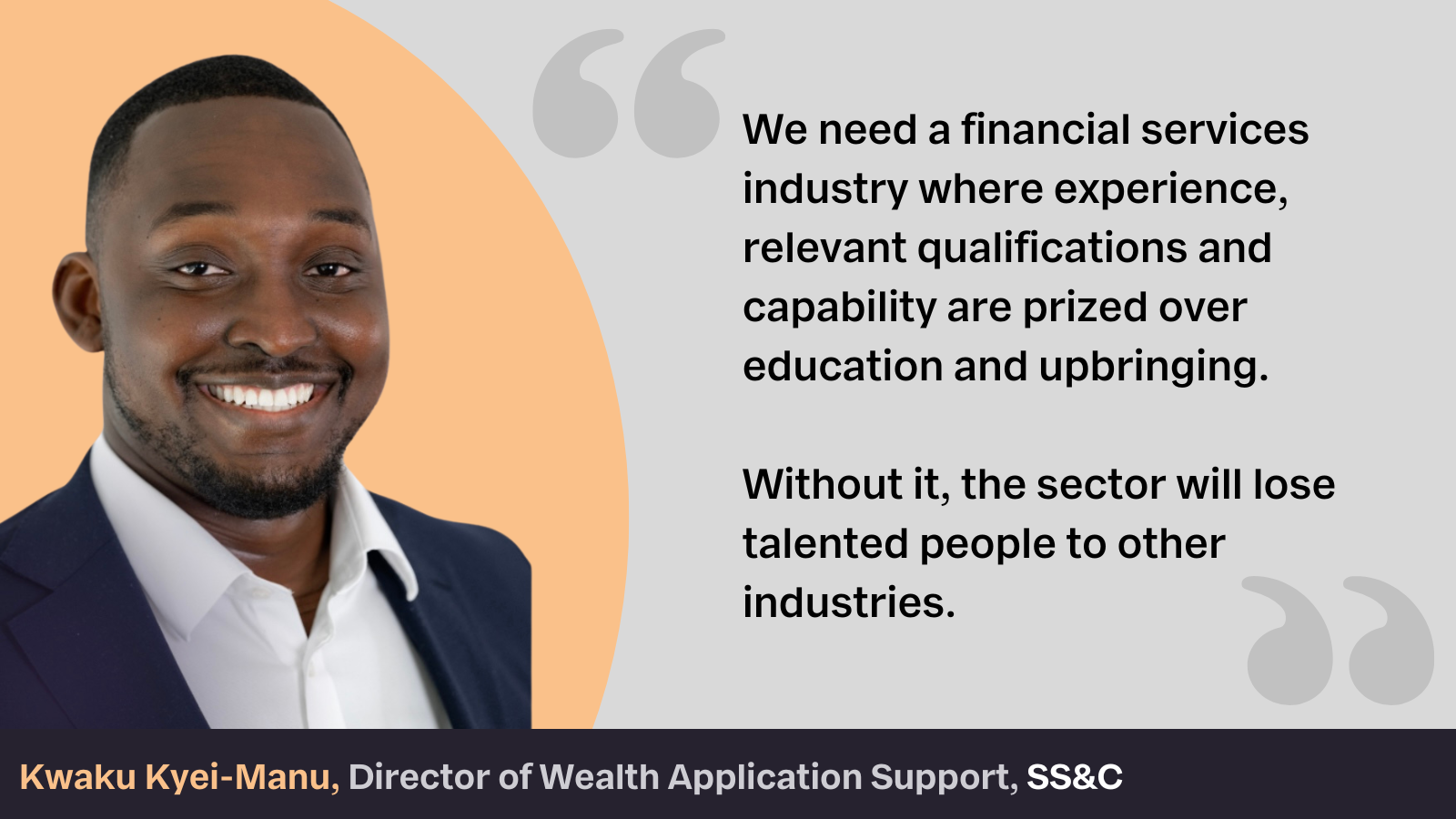“We need a financial services industry where experience, relevant qualifications and capability are prized over education and upbringing. Without it, the sector will lose talented people to other industries.”
Kwaku Kyei-Manu, an award-winning tech specialist from a working-class family, shares why he left financial services for the technology sector
Kwaku Kyei-Manu, Director of Wealth Application Support at SS&C, was initially excited by the prospect of a career in financial services. However, he soon realised that his talents and performance were being overlooked because of unwritten rules and biases around social class and ethnicity.
The truth is that Kwaku’s career in financial services was being hampered by a sector where white men from higher socio-economic backgrounds dominate senior positions. Since changing industries, Kwaku has been promoted several times and was a 2023 recipient of a Black British Business Award.
There is clear evidence that people from lower socio-economic backgrounds progress more slowly in financial services than their peers from more privileged backgrounds, despite no link to job performance. This disparity increases for people who also identify as black.
Moreover, half of all senior roles in financial services are held by white people from a higher socio-economic background, according to Progress Together’s Shaping our Sector report.
Progress Together is a not-for-profit membership body working to ensure that everyone in financial services can reach their potential based on job performance, not where they started out in life. Its membership includes many of the biggest names in UK financial services, including Fidelity International, Phoenix, Santander, Schroders, Paragon Bank, HSBC, Aviva and Nationwide.
Lightbulb moment
For Kwaku, his ‘lightbulb moment’ came when he was offered a Vice President position which was then reduced to Associate level because he did not have a degree, despite demonstrating years of experience.
“It’s important that people working at all levels in an organisation reflect the society we live in,” Kwaku says. “We need a financial services industry where experience, relevant qualifications and capability are prized over education and upbringing. Without it, the sector will lose talented people to other industries.”
Kwaku’s story is not uncommon in financial services and is even more pronounced for working-class women from ethnic minority backgrounds, with white men from higher socio-economic backgrounds 33 times more likely than them to be found in senior positions.
As stated in their recent Diversity and Inclusion consultation, the Financial Conduct Authority (FCA) and Prudential Regulation Authority (PRA) acknowledged that almost 9 in 10 senior roles in financial services are held by people from higher socio-economic backgrounds, and employees from lower socio-economic backgrounds take 25% longer to progress, despite no evidence of a difference in performance. They are also paid £17,500 less per year on average than their peers from higher socio-economic backgrounds, which is the largest pay gap for any sector – almost four times higher than the technology sector, with which the financial services sector is often competing for talent.
£19 billion
According to Sophie Hulm, CEO at Progress Together, “The financial services sector is losing out on top talent like Kwaku. The stakes are high. The Financial Services Skills Commission predicts 260,000 highly skilled professionals may leave the sector in the next decade – a quarter of the current workforce. Employers can keep hold of high performing talent by ensuring that promotion processes are open and transparent. Progress Together members are working collaboratively to share practical actions. But, this is not just a talent issue. By having diverse backgrounds and experiences at the decision-making table, employers can better understand a broad range consumers and develop innovate products and services.”
Sophie adds: “Having a wider range of viewpoints, ideas and experiences at the top helps to encourage much greater creativity, productivity and innovation. This not only benefits business and individuals, but also the wider economy. A recent report, launched by the Employment Minister, Demos and the Co-op, suggests that improving social mobility across UK workplaces could boost annual GDP by £19 billion, generating around £6.8 billion in yearly tax revenues and boosting profits by over £1.8bn a year.”
“For the financial services sector to be globally competitive, and to bring much needed economic growth, our Government and the regulators must ensure all financial services firms are holding on to talented people like Kwaku. Progress Together members are ahead of the curve, and will win the war for talent, but we urgently need the rest of the sector to reap the business benefits too”
Regulators
For this reason, Progress Together is calling on the Financial Conduct Authority and the Prudential Regulation Authority to make it mandatory for financial services firms to report the socio-economic background data of their workforce. The organisation also wants to see the government enact the socio-economic duty of the Equality Act, as stated in the Labour Manifesto, making it clear that it applies to the financial services regulators as public bodies.
City AM
City AM has published Kwaku’s story!





